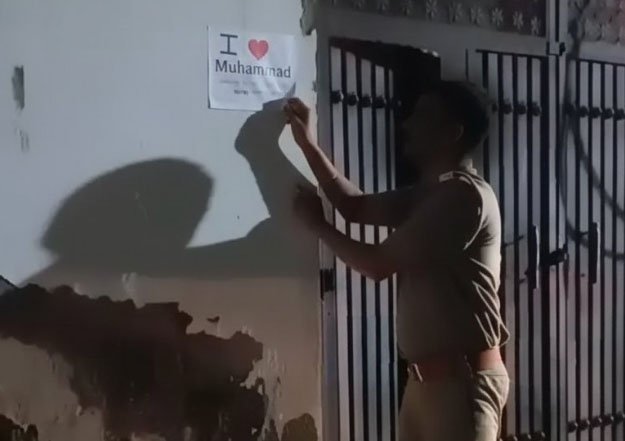A growing concern has emerged in Bareilly after reports surfaced that local police officials are removing posters bearing the words “I Love Muhammad (Peace Be Upon Him)” from homes and shops in Muslim majority areas. The move has sparked outrage among residents, who see it as a violation of their constitutional right to express religious love and belief.
What Happened in Bareilly
According to local sources, police teams have visited several colonies, directing residents to remove posters and banners displaying the Prophet’s name, citing “Law and Order” concerns. In some Areas, Residents allege that police used pressure and intimidation, warning that such displays could “create tension.”
For many Muslims, however, the posters are not political they’re expressions of deep love and reverence for the Prophet Muhammad (PBUH), a central aspect of their faith. “How can saying I love Muhammad be seen as a crime? This is our Prophet, our faith, and our identity,” said one resident.
Questions of Justice and Democracy
Legal experts and civil rights activists are questioning the constitutional validity of these actions. Article 25 of the Indian Constitution guarantees every citizen the freedom of religion and expression, as long as it does not disturb public order.
If the posters are peaceful and non-provocative, removing them raises serious concerns about selective policing and suppression of religious identity. It also begs the question is expressing love for one’s Prophet now being misinterpreted as a provocation?
This incident has reignited debates about religious tolerance and equal treatment under the law. Citizens are asking: if similar posters from other communities are not objected to, why is this singled out?
The Larger Issue Misplaced Priorities
At a time when India faces pressing issues like unemployment, inflation, and social unrest, many wonder why law enforcement is focusing on religious expressions instead of addressing real threats to peace and justice.
Observers argue that such actions alienate communities and deepen mistrust, instead of building harmony. They also note that these repeated controversies over harmless symbols of faith reflect a disturbing shift where religious identity is policed more than actual crime.
Faith Is Not a Threat
For Muslims across India, saying “I Love Muhammad (Peace Be Upon Him)” is not a political slogan. It is a declaration of love and devotion, no different from expressions of faith seen in other religions. Suppressing such sentiments only undermines the secular spirit of India’s democracy.
A Call for Reflection
The government and police must ensure that their actions uphold justice, equality, and sensitivity. Selective enforcement risks damaging trust between citizens and the state. India’s strength lies in its diversity and mutual respect — not in fear or suspicion.
As one community leader in Bareilly put it:
“We don’t seek privilege only fairness. Let us love our Prophet in peace. Faith is not a crime.”
True democracy protects every citizen’s right to express their faith with dignity. Actions that silence peaceful belief do more harm than good. It’s time for authorities to reflect on what message they’re sending and whether it aligns with the spirit of the Constitution.















